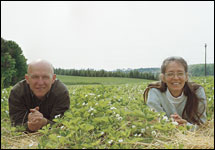MLUI / Articles from 1995 to 2012 / Sandee and Bernie Ware:
Sandee and Bernie Ware:
Growing success with entrepreneurial agriculture
June 16, 2003 | By Jim Dulzo
Great Lakes Bulletin News Service
Friends & Neighbors Sandee and Bernie Ware own a 170-acre farm in Manistee County. They joined the Institute in 1994, when it was still calling itself the Michigan Community Land Use Coalition and working to bring more public oversight to a huge gas-drilling development proposal in the beautiful region where they live. Today the Wares are completing a transition from standard commodity farming to organic and entrepreneurial agriculture. After staying up all night guarding seedlings from a spring frost, Bernie talked to the Institute’s Jim Dulzo. JIM DULZO: Why the change to organic and entrepreneurial agriculture? BERNIE WARE: Sandee was always an organic gardener. We kept saying that she would quit the job she had off the farm and then we would start moving towards organics. But we’d always put it off. Then I was injured in a farm accident and had time to just lie there and think. I realized every day was a gift and that we were just kidding ourselves by waiting. We decided not to worry so much; organics was the right thing to do and the economics would follow. Now that we’re almost there I see other benefits: Wildlife diversity, our soil, networking with really wonderful people. JIM DULZO: Why did you join the Institute? BERNIE WARE: They were educating people here about the drilling, and I had just joined Pleasanton Township’s planning commission. The Institute helped us draft an ordinance regulating the placement and the noise of gas compressor facilities. No one else was helping us. I feel especially appreciative now as a citizen on the planning commission because of the Institute’s work on Smart Growth. It is a real service to northwest Michigan. Sandee and I feel that the Institute can rattle cages, get more done at the legislative level. We really appreciate that. JIM DULZO: What is your impression of the Institute today? BERNIE WARE: It’s not like I totally agree with absolutely everything that comes out of the Institute, but it makes me think. That’s very helpful; I see my planning commission work as community service, and the Institute gives me perspective. I particularly appreciate Patty Cantrell’s entrepreneurial agriculture project. JIM DULZO: What entrepreneurial things are you doing? BERNIE WARE: We are pickling asparagus. We’re freezing strawberries for some recipes we use with a local dairy farm for a product we will test in food co-ops. We are also looking at a family recipe for sauerkraut. We are doing some salsas, too, and possibly some fruit juices. It’s a conscious effort to process as much of our own food as we can. We are fairly confident we can put these things into a few stores. But we don’t want to get too big. It adds up on paper; we just haven’t figured out all the hurdles yet. JIM DULZO: Are you participating in our Seeds of Prosperity agricultural conference? BERNIE WARE: Yes. We’re supplying the salad greens for that. The conference isn’t for growers, but I like it because we need the support of government agencies for entrepreneurial agriculture. There is a huge potential in entrepreneurial agriculture for the region’s smaller growers. At this conference, if government people get involved and start helping people through the process, things could really blossom. JIM DULZO: Would you recommend the Institute to other people? BERNIE WARE: Yes. As a planner, I appreciate the way it promotes Smart Growth. And as a farmer, its work on land preservation and entrepreneurial agriculture — those stories must be told and the Institute is telling them.

Sandee and Bernie Ware: Making the transition from commodities to local markets.





